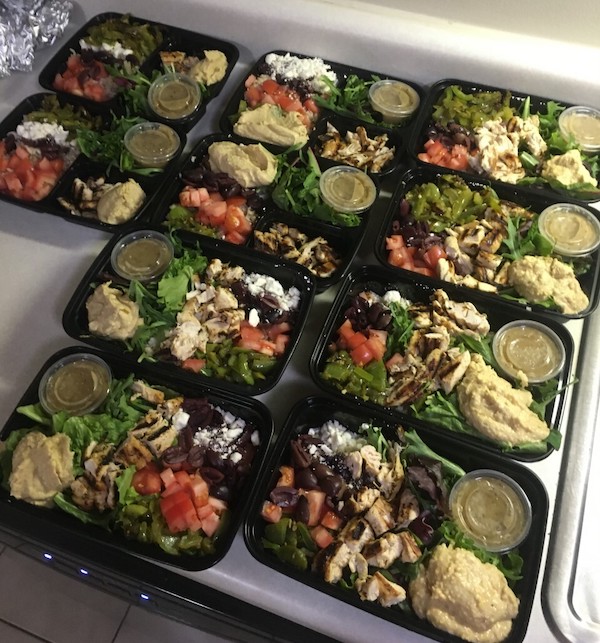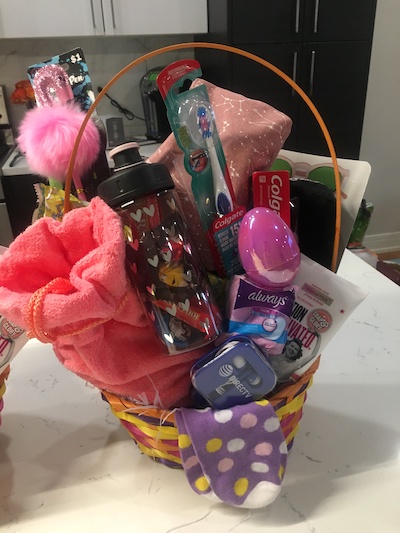Making brown-bag meals for the needy helped this law student stay busy and safe during the COVID-19 pandemic

Recent law school graduate Jacqueline Ingles' efforts include baked ham, Brussels sprouts, mashed potatoes, Greek rice bowls with homemade hummus and matzo ball soup. She makes all of it from her one-bedroom apartment.
Assembling sandwiches helped recent law school graduate Jacqueline Ingles focus during remote classes, and over the past year she made more than a thousand of them for the Chicago Help Initiative, a nonprofit group that takes food to pantries and free meal sites.
Her efforts also include baked ham, Brussels sprouts, mashed potatoes, Greek rice bowls with homemade hummus and matzo ball soup. She makes all of it from her one-bedroom apartment.
“I have a slow cooker I’d use if classes were going on. And I would make sandwiches during class where there was just a lecture, and no heavy note taking. They would just see my face,” says Ingles, who graduated from Chicago’s Loyola University School of Law in May.
Ingles drops the food off at the Chicago Help Initiative. She’s made the most meals of any single volunteer, says Doug Fraser, executive director of the Chicago Help Initiative.
In addition to cooking for the needy, Ingles makes Easter baskets for kids in care of the Illinois Department of Children and Family Services, Block Club Chicago reports. This year she made 60 baskets, filled with many donations made through Amazon.
 Jacqueline Ingles.
Jacqueline Ingles.
Her family has a criminal defense law firm, Ingles & Ingles, and she started the Easter basket project after meeting a social worker through the office. The Chicago Help Initiative connection came through an announcement on her law school’s website. She grew up cooking with her mom, who taught her how to make almost everything from scratch. Ingles has an autoimmune disease, and says cooking was a good distraction over the past year when she needed to stay inside for health reasons.
“When God gives you an ability, you use it,” she explained. “I knew when I saw the digital flyer for the Chicago Help Initiative that this was a sign from above to share my love for cooking.”
Many people who needed food were not homeless, but they had recently lost their jobs. They appeared to be the same age as her parents.
“It really just broke my heart to see this, and I have to keep doing it as long as somebody is in need of it,” says Ingles, who sold a contract law textbook she didn’t need anymore to cover the first meals. She also put her stimulus money toward food. Her parents chipped in too, and she has a Go Fund Me page, which raised $1,790 so far.
“I’m really good with coupons, and finding out what’s on sale that week,” says Ingles, who won French bread and spaghetti noodles through the Jewel-Osco grocery store chain’s Shop, Play & Win! Monopoly pieces.
She started making meals other than sandwiches about four months into the project.
 In addition to cooking for the needy, Jacqueline Ingles makes Easter baskets for kids in care of the Illinois Department of Children and Family Services.
In addition to cooking for the needy, Jacqueline Ingles makes Easter baskets for kids in care of the Illinois Department of Children and Family Services.
“What’s the nutritional value of a sandwich? It’s two slices of meat; how nutritious is that? Plus sandwiches cost a lot of money. I thought with the amount I put toward sandwich meat, I could make lasagna, chicken enchiladas—things that had more nutritional value than a sandwich,” she says, adding that nonsandwich meals are more filling and may provide more than one portion.
“A lot of times, this food is lasting people through the weekend,” says Ingles, who buys to-go containers at Jewel-Osco, restaurant supply stores or on Amazon, depending on who has the better deal.
After the July bar exam, Ingles plans to focus on writing a true-crime novel about Andre Crawford, a Chicago man convicted of brutally murdering 11 women. Ultimately, she’d like to work as a legal analyst with the network Court TV.
She initially planned to scale back on cooking while studying for the bar, but now says meal-making fills a need she has to multitask.
A few days before Memorial Day weekend, she was planning a holiday-themed meal for the Chicago Help Initiative: grilled chicken breasts, corn on the cob, macaroni salad, watermelon, lemonade and an American flag cookie.
“It’s an ode to America via cuisine. I’m still debating homemade cornbread,” she told the ABA Journal.



